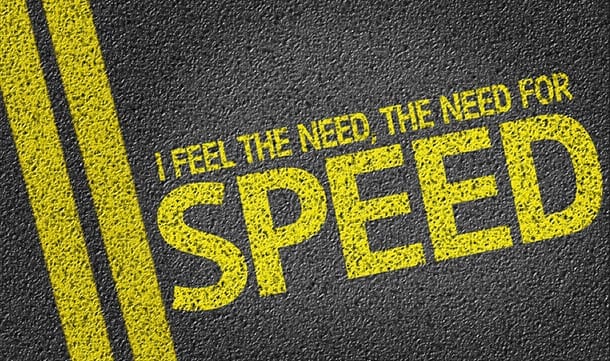
Need For Speed – Fast Car Finance
If everything seems under control, you’re just not going fast enough. Fast or faster doesn’t make the cut. Fastest is the nirvana of speed we seek to be. We’re a society obsessed with speed and everything has to keep up. We demand it and our expectations have evolved the speeds at which we download our phone apps, view online videos, pay for merchandise and services with a quick tap of our credit cards, even place applications for fast car finance without so much as leaving our seats from home.
Just a few days ago, an anonymous Aussie just bought the world’s fastest car—the Bugatti Veyron, which has a top speed of 431 km/h, almost twice the speed that planes take off. It blasts off from 0 to 100km/h in around 2.5 seconds, as fast as a Formula One car. I do wonder if the mystery buyer intends to garage his newly acquired Veyron as an iconic collectible and unveil it every now and then to a few of his select upper class counterparts at an exclusive by-invitation-only wine swirling soiree at his private residence. After all, it can hardly ever be driven on Australian roads and was never officially sold Down Under due to its left-hand drive. I suppose I’d rather simply fantasise a far more exciting scenario, such as this mysterious Jay Gatsby-like character choosing to take his prized icon for a spin in a certain section of the Stuart Highway located in the Northern Territory that has commenced trials of unlimited speed limits. No surprises if Gatsby had a friend in high places who could get him a special permit for left-hand driving.
Fast Car Finance For Thrillseekers
Here’s more cheap thrills for speedsters and fodder for thought. I do wonder if he’ll want his money back if he knew two things: One, that his Bugatti Veyron has been unseated by American muscle in the form of the Hennesy Performance Venom GT which compassed the speedometer faster than the Veyron at 435.5km/h during a test run at the Kennedy Space Centre in Florida. However the consolation is that Bugatti shall remain crowned as the world’s officially fastest car under the Guinness book of records. I see Gatsby dabbing the sweat on his brow with his monogrammed handkerchief on that relief.
But not so fast. Just wait till he finds out something far worse than having his speed broken. How about the fact that the Bugatti Veyron is a police patrol vehicle in the extravagant emirate of Dubai! Uh huh, not sure who’s more afraid—crooks in Dubai trying to evade the heat of the ‘coppers’ in high-speed chases with the cops having the obvious unfair advantage, or Gatsby. No fun when you’ve paid in excess of a cool 3 million dollars for a brand new Veyron Supersport only to find out your iconic collectible is featured as part of an outrageous, conspicuous police patrol fleet alongside Lamborghinis and Ferraris in ‘World’s Fastest Police Car Chases’ shot in an oil-rich city on the Persian Gulf. Same ‘face-palm-moment’ when wealthy noveau-riche Asians first found out their luxury Mercedes E-class was merely a taxi in Germany.
Do you have a face palm moment trying to go as fast as you can in whatever it is you drive? Yes, I meant speeding tickets. We all don’t do so great when we go beyond first times pushing limits behind the wheel, whether it was for legitimate reasons or not, there’s just no reason for our callous disregard for our own and other people’s road safety. This need for speed simply reflects a terrible reality of urban modern life. We’re addicted to speed out of necessity and out of thrills. Often, thrill-seeking is an addictive impulse and grows a habitual need in us to be fed once, twice and then again. And it seems males are more likely to be reckless drivers, particularly when it involves speeding. It makes perfect sense when scientific research proves the supposition of ‘fear’ creates the ‘rush’ we get with the sense of exhilaration or happiness, which are really derived from endorphins and dopamine being released and passed along neurotransmitters in the brain. How deadly can speed be when we are thrilled to seek potentially dangerous activities to seek the insatiable sensation of ‘high’.
Lawmakers in Australia have long insisted that speed kills. Speed kills because they say it remains the top cause of all road fatalities in our country, and represents a factor in about 40% of all road deaths that cost our community billions. Explain to us why, then, that the 12-month controversial derestricted speed limit trial along a 200km section of the Stuart Highway north of Alice Springs in the Northern Territory is a proven hypothesis that our local motorists can be trusted with the responsibility of obeying road rules. So far there hasn’t been a single death or serious injury following the progress of the trial. In fact, its very success is leading the NT transport ministry to open further highways to participate similarly as an expansion of the trial. Truckies and other road users are reportedly pleased with its promise and feedback has been nothing but encouraging. Many are unanimously supportive of higher speed limits to reduce driver fatigue in the supposition that it will lower road toll. We’ve all been subjected to the mind-numbing monotony of endless highway cruising and understand how easy it is to fall into a hypnosis as we float away into semi-conscious slumber.
The fact remains that in thousands of kilometres of roads globally, drivers have been treated as grown-ups and trusted to run at 130km/h or more, but why aren’t we seeing this in Australia? Polish and Bulgarian drivers enjoy speeds of 140km/h, only behind Germany where of course everyone has heard of the notorious autobahn where speed limit is an oxymoron. In these European countries, they have shown us it is possible to safely implement higher speed limits yet see lower fatality rates on their roads than Australia.
In other states, a maximum of 100km/h speed limit applies to the ACT, while a 110km/h limit applies to NSW, Victoria, Queensland, South Australia, Tasmania and Western Australia.
We understand that increasing the speed limit in built up zones, school zones and road work sections wouldn’t be beneficial as studies have shown that speeding doesn’t always save you time, however we do agree that highway driving speeds should be reviewed.
Will lawmakers start to take the middle position to consider that wherever a higher speed may be acceptable, it should perhaps be considered for implementation based on the appropriate conditions of the highways or roads in question? There is so much credit given to speed cameras for reduction in road tolls but little acknowledgement for the other heroes: increased safety features of new vehicles today and our better built roads than when they were first being metricated in 1974.
Why don’t we get to drive at higher speed limits and get to where we want much faster, rather than sluggishly crawling at indolent 100km/h enforcements along stretches of gumtrees without end, entering into unwanted driver narcosis. Maybe all we want is fast, not furious.
Are you trying to get your car, bike, truck, boat, caravan or equipment financed at the best deal coupled with the fastest possible speed of approvals? Call our experienced consultants at 360 Finance. We understand best and fastest is the ultimate goal.

